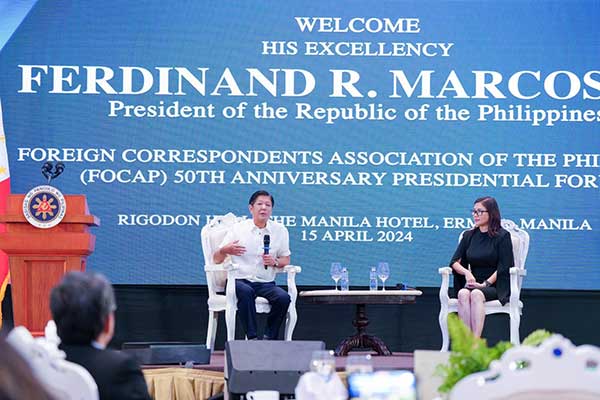
By Francis Allan L. Angelo
On the eve of President Ferdinand Marcos Jr.’s third State of the Nation Address (SONA), media groups nationwide are calling for decisive actions to bolster press freedom in the Philippines.
Convenors of the 1st Philippine Media Safety Summit* emphasize the urgent need to decriminalize libel, pass a Freedom of Information (FOI) law, and halt the red-tagging of journalists.
In a statement, the group underscored the President’s previous remarks about the essential role of a critical press in serving the national interest.
“The President himself said it in April: ‘The principal role of the press is not to applaud those who govern, but to hold us accountable’,” they noted.
President Marcos made these comments during an April 2024 forum hosted by the Foreign Correspondents Association of the Philippines (FOCAP), where he highlighted that “national interest is better served by a press that is critical rather than a press that is cooperative.”
Libel, often weaponized against journalists, has been a key issue. Several legislative measures have been introduced to decriminalize it, aiming to protect journalists from being targeted through libel suits meant to deter criticism.
“The President himself said it in April: ‘The principal role of the press is not to applaud those who govern, but you hold us accountable, without holding back in giving praise to those who deserve it. Along with that stance is our collective goal of protecting the welfare and lives of journalists,’” the convenors reminded the President.
“Now is the time for Mr. Marcos to keep his promise and include efforts to ensure a ‘truly free and safe environment for all journalists’ in his SONA legislative priority,” the group added.
The media groups also addressed the pervasive issue of red-tagging, a practice where individuals or groups are unjustly labeled as communists or terrorists. This practice has particularly endangered journalists, leading to threats against their safety.
The Supreme Court has supported the issuance of a writ of amparo to safeguard individuals from such threats, stating in a recent decision that: “Red-tagging, vilification, labeling, and guilt by association threaten a person’s right to life, liberty, or security, which may justify the issuance of a writ of amparo.”
Another significant concern is the need for a comprehensive FOI law. Although an executive order on FOI was issued by the previous administration, it only applies to the Executive Branch.
A legislated FOI law, supported by various business organizations and chambers of commerce, would ensure transparency across all government branches.
Additionally, the group is advocating for the removal of a provision in the Comprehensive Dangerous Drugs Act of 2022, which designates journalists as potential witnesses in drug cases.
This provision puts journalists at risk of being cited for contempt or facing arrest warrants if they fail to appear in court as witnesses.
“For as long as this provision is not removed, journalists are at risk of being cited for contempt or subjected to arrest warrants for not showing up in courts as witnesses in drug cases,” the group said.
*The Philippine Media Safety Summit convenors include the following:
-Asian Institute of Journalism and Communication
-Center for Community Journalism and Development
-College of Mass Communications-UP Diliman
-Foreign Correspondents Association of The Philippines
-Freedom for Media Freedom for All
-Mindanews
-National Union of Journalists of the Philippines
-Peace and Conflict Journalism Network
-Philippine Center for Investigative Journalism
-Philippine Press Institute
The summit was held on May 1-3, 2024 in Quezon City. Daily Guardian took part in the summit which came up with the Philippine Media Safety Summit Declaration.




















